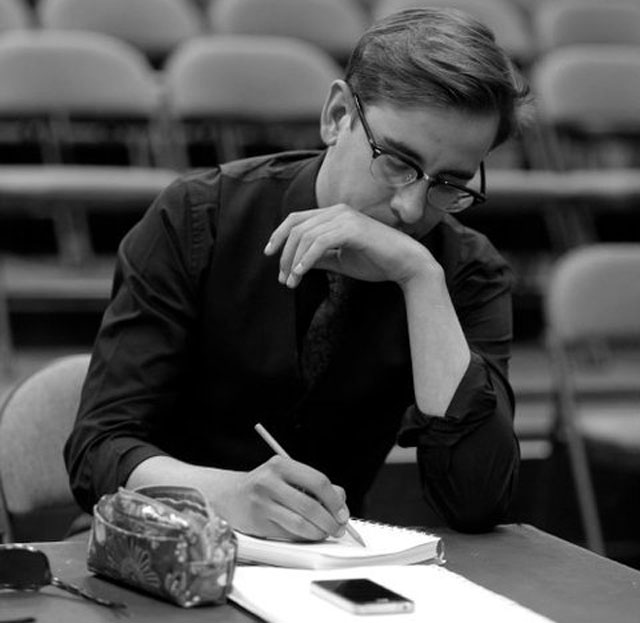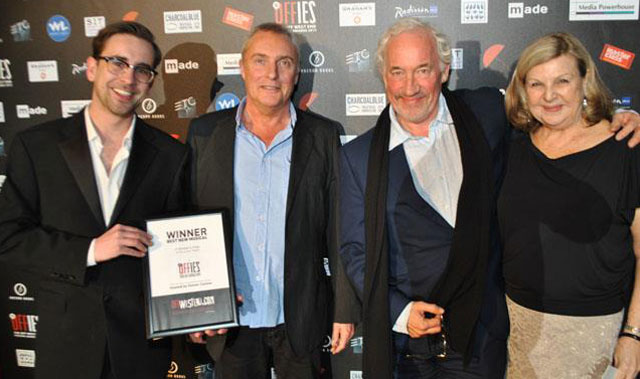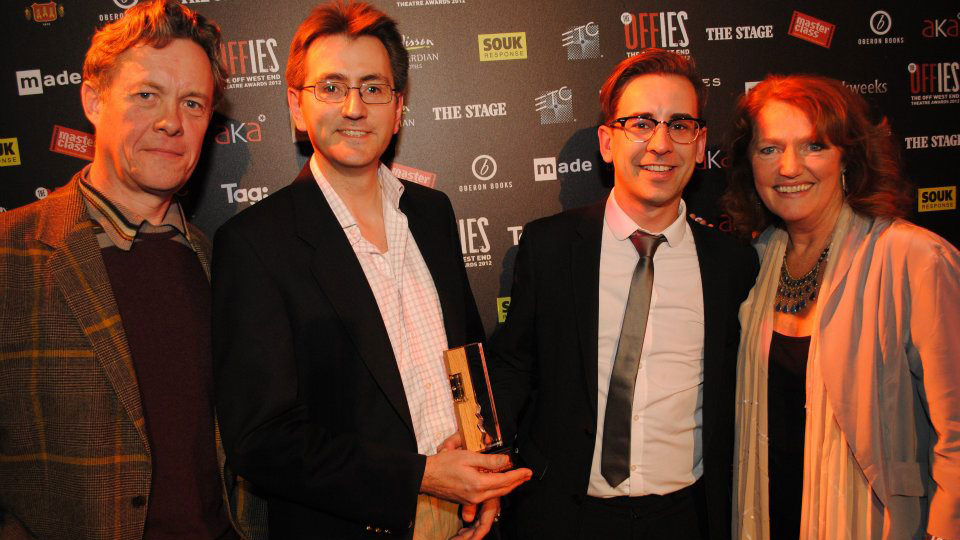Andrew Keates is a multi-award winning director of productions such as Bent, Just So, The Hired Man, The Thing About Men, A Winter’s Tale and As Is. He co-ran the Landor Theatre for over three years until 2012, when he set up his own company, Arion Productions.
His acclaimed production of Martin Sherman’s Passing By will be revived for the Tristan Bates Theatre, starting 5th November, starring James Cartwright and Rik Makarem.
We recently caught up with him for an exclusive in-depth interview. In this second part we find out about how his time at Guildford School of Acting tuned around his fortunes; how he acquired an interest in musical theatre and how that led to a successful collaboration with composer Howard Goodall.
Was drama school a happier experience than school?
I auditioned and obtained a place at the Mountview Academy of Theatre Arts. I went with such eagerness. Such optimism. Then, I fell in love for the first time – with a straight man (who would later become a not very straight man at all, but anyway…) we had this secret relationship. It was so exciting. I had never felt more alive. So loved. Then, my nan was diagnosed with cancer of the brain. She was dying; every weekend I would go home to be with her and my family in Bournemouth. It’s such a cruel illness. Every weekend another part of her would seem to die, but I’d look into those beautiful, wise, old eyes and her spirit would still be there.
As the year progressed I watched as nearly everything that I held dear disappeared. My partner couldn’t acknowledge me in the corridor, yet he’d still come home and there’d be a dinner waiting. Our naughty, exciting and beautiful times together became a chore and I became unbearable and emotionally unstable. Then, one day the phone call came that my nan had passed away. For the first time my partner held me in the reception office in full view and I sobbed like a child. I felt like I had lost a parent and could feel I was losing him too.
It’ll be no great surprise that my studies suffered and I sank into a very, very deep depression. I was angry and I was hurting. I felt like I was losing everything; my family, my beautiful boyfriend and my career. So one night (after being prescribed ridiculous anti-depressants) I decided to take an overdose of paracetamol, sleeping tablets and a lot of vodka. I woke up at the Royal Free Hospital with my partner and family looking over me. I was furious I was still alive. He said to me that it was the most selfish thing I had ever done; we split up and I pushed my family away. I understand now why it happened. But I was a very ill person who has had a long time to heal. My biggest regret in life is that we still haven’t spoken to this day. I send an e-mail every year. That must have been nearly nine/ten years ago.
I ended up feeling dead inside. I felt alone in a big old world and found myself living in putrid squalor. Then one day I went into my rancid bathroom, and I noticed on the ledge near my sink, there was some toothpaste scum – I started to pick away at it with my fingernail. I then started to clean the whole bathroom, the corridor, the whole flat; I shaved and had my hair cut. I found myself having a tabula rasa, as said in The Tempest – a blank slate. I ended up in Brighton living with some drag queens that taught me to laugh again (most notably a friend from Bournemouth who was working on the Brighton Scene called Miss. Jason (Sutton)). I found myself wanting to live again.
But you ended up at the Guildford School of Acting?
So, after returning from Brighton I found a new lease of life. I found time and forgiveness from my family and one day, I decided to phone the Guildford School of Acting, and explained everything that had happened at Mountview. This stranger asked me to put it all in an email, so I did. In many respects I wrote my de profundis. He responded by inviting me to a summer school to see if it was the right place for me. So I went along and spent a week there and I loved it. I loved the feel of Guildford, and the trees, grass, little stone bridges: it was quirky and beautiful. The man I’d spoken to on the phone was Gerry Tebbutt (GSA Head of Performance), who is the biggest musical theatre anorak I’ve ever met, and I loved him for it. I saw the passion that I’d sought and even though the school wasn’t without its faults. I finally found a sanctuary to learn and to just be. I auditioned and was accepted. I was given another chance.
I haven’t shared this story publicly and if I’m honest, I’m scared how I’ll be judged for doing so. However, I think it’s important to say, that I feel like I wouldn’t be doing all I’m doing now unless I had lost everything. I sincerely believe, to lose everything makes you appreciate everything.

What did you learn at the Guildford School of Acting?
Like all drama schools, you often learn the most from terrible teachers, of which Guildford certainly had its fair share, let me tell you! Guildford helped me work out what sort of director I didn’t want to be. Some directors would give line-readings or not know what they were talking about, some had just lost their passion. However, it had more inspiring people than bad ones. I owe an awful lot to them; watching the way they ran their rehearsal rooms, how they facilitated their students, how they mixed nurture and discipline was incredibly insightful and invaluable as part of my training for the future. I will always be especially thankful to Julia Carey, Sheila Allen, Michael Moor, Ian Ricketts, Russell Labey, Peter Roberts, Gerry Tebbutt and Matt Smith. True soldiers of the arts; inspiring; people who actually gave a shit about the work! One day I’d like to go back and work with the students there now. It’s incredible how much teachers can inspire. Too much deadwood floats around these institutions. They should be vibrant places of creativity, not dust-laden institutions of politics and money; as so many of them seem to be now.
The greatest gift that Guildford gave me was the best group of friends in the world. We’re as close now as when we were at school, in fact, more so. They’re an extraordinary bunch. This is one of the hardest industries in the world and regardless of whatever I’m working on or not as the case can be, they’re always there to support in the good times and the bad. I know we’ll all grow old together.
Where did a love of theatre come from?
Shakespeare was my first love. Once, I was reading fairy tales and children’s stories: but I was hungry to read more. Then I discovered the most magical book of all, The Complete Works of William Shakespeare; which only worked when I read them aloud. Instinctively, it felt very natural. As a boy I was in Henry V, Romeo and Juliet, Macbeth, I was Puck in A Midsummer Night’s Dream and a whole load of other typical stock characters a boy would play whilst I was with the Bournemouth Shakespeare Players. I loved it. Then, I started reading Ibsen and Chekhov, playwrights most people wouldn’t discover until they were doing their degree, yet I was reading them when I was ten! I’ve always respected and adored language. It’s where I’m at my happiest.
Was it the same for musical theatre?
I didn’t really have an interest in musical theatre back then. I was ignorant to it. However, I’ve always adored all kinds of music. I’m quite eclectic in my tastes. I always wanted to play the piano, but we couldn’t afford lessons, so my mum bought me a £50 piano out of a local advertiser and a load of sheet music from a car boot sale, so I could teach myself to play. I still play now.
My mother, who knew I liked theatre, bought this big box of CDs, records and cassettes from a local car boot sale. In there were so many different shows, including Sunday in the Park with George. What was this strange show? I listened to it and it opened a whole new world to me. It still does. It affected me in a way that would change my life. There was a lot of other Sondheim in that box too, so I suppose I was one of the few kids in this country who was introduced to the music of Stephen Sondheim before Andrew Lloyd Webber.
To go from Shakespeare to Stephen Sondheim and Cole Porter, Irving Berlin, Rodgers and Hammerstein didn’t seem like a massive jump. Great stories are great stories. Great texts are great texts. I will always appreciate the skill of those who can master a libretto, lyrics and a musical language. Creating a musical has to be one of the hardest things to do in our profession. I don’t know why it’s not respected more as an art form.

You received great acclaim for directing the musical The Hired Man. Tell us about that.
You tell the story with the tools you’ve got. If you get someone as fine as a composer as Howard Goodall, who can orchestrate and create such an astonishing score and lyrics, whilst at the same time having a wonderful book by Melvyn Bragg, then my approach was to decide what was the simplest, most effective, visceral way to facilitate the story. The Hired Man was staged with barrels, cartwheels, hay bales and a lot of passion. We had a company of fine actors who treated ‘the work’ as paramount. We felt like we were making great theatre, because we all wanted to serve the piece. We wanted to serve Howard and we wanted to be true to Cumbria’s history. We were thrilled the show seemed to speak to so many people and it was an honour to receive Best Musical Production in the OffWestEnd Awards. I really wish that the production had somehow got a future life somewhere. I’m really very proud of it.
You’ve also directed and developed another of Howard Goodall’s musicals, A Winter’s Tale. How did that collaboration come about?
I believe Howard Goodall is one of the most undervalued, talented musical theatre composers in this country. His work is exquisite. After The Hired Man, I was invited to the House of Lords – not bad for a lad from Ferndown! I walked in and met Lord Melvyn Bragg and Howard, we sat down to a crumpet and a cup of tea. Then, Howard handed me a CD and said, “I have this show and I think you’re the man to make it work”. Myself, PBJ Management, Faber Music, Howard Goodall and the my newly formed Arion Productions, collaborated and turned what was originally a children’s musical into a more adult, grown-up story, telling the story of A Winter’s Tale, based on Shakespeare’s The Winter’s Tale. He trusted me to take the show back to its Shakespeare roots and update it for modern audiences. Developing a new musical is one of the hardest things in the world, but I was very happy with it. It still needs some development and I can’t wait for the next time we work on it together. It’s wonderful when my love of Shakespeare can collide with my love of musical theatre, especially with a composer who never fails to inspire me.
In the final part of our interview Andrew talks about his productions of Martin Sherman’s plays, from Bent to Passing By; his time at the Landor Theatre and his ambitions for the future.
You can see Andrew Keates’ transfer production of Passing By at the Tristan Bates Theatre near Covent Garden from 5th to 30th November. You can book tickets by visiting the Tristan Bates Theatre website.
For more details about the work of Andrew Keates, see his website.



